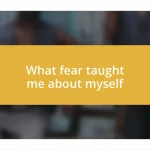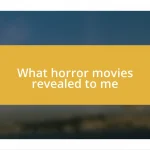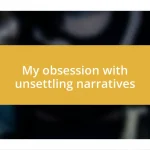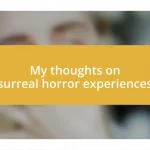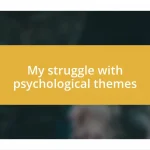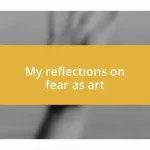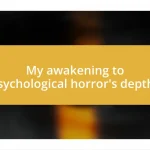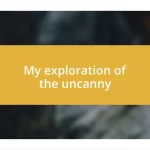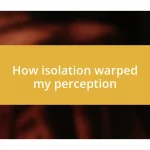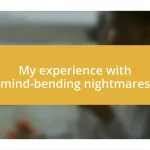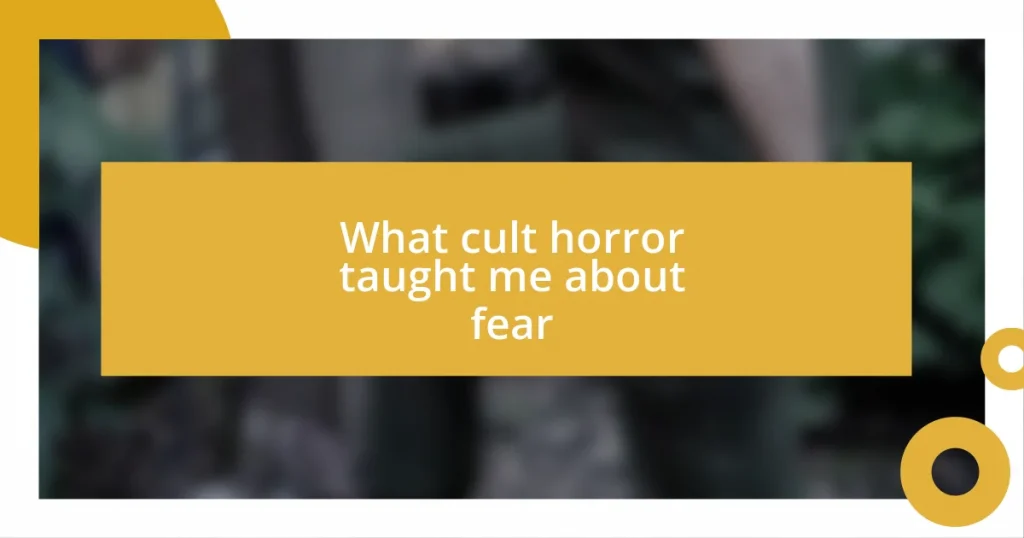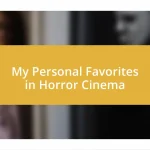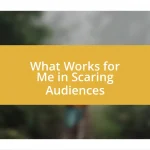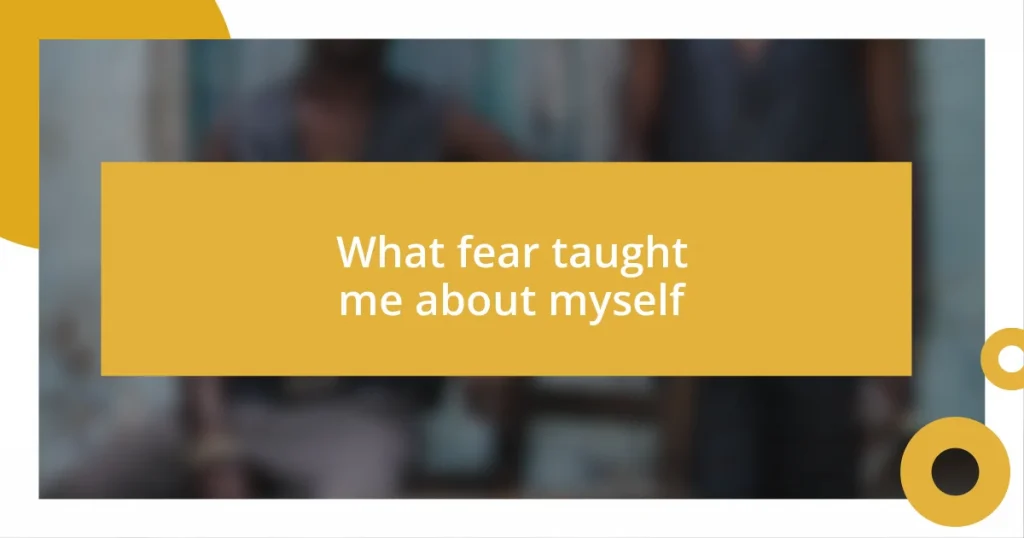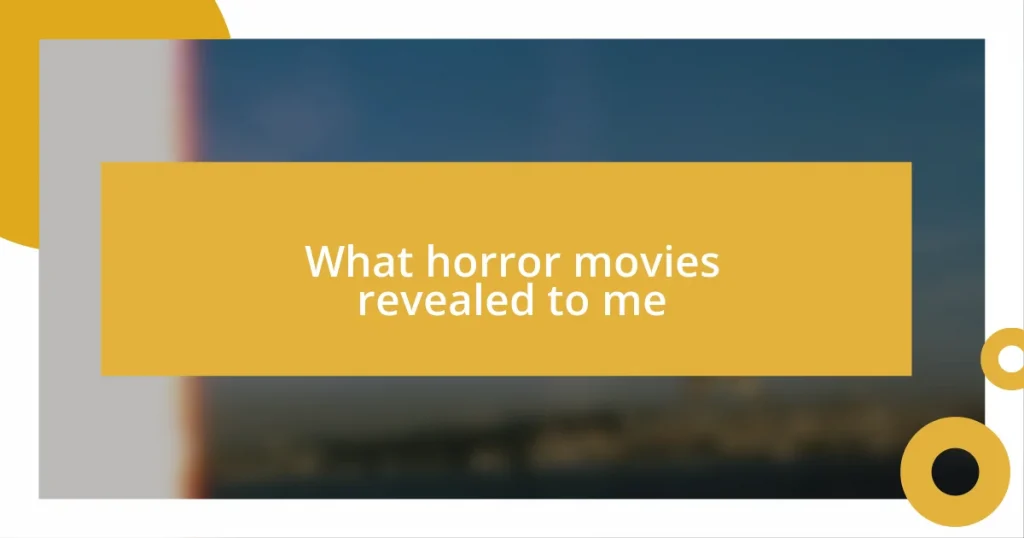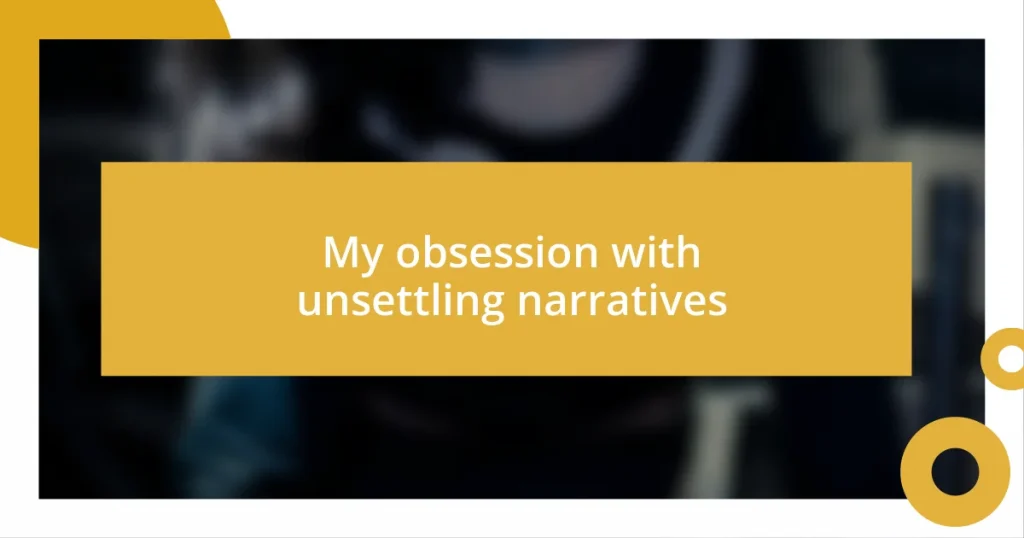Key takeaways:
- Horror effectively engages with both familiar and unknown fears, allowing viewers to confront their anxieties safely through fiction.
- Cult horror films foster community and provoke discussions on social issues, challenging viewers to reflect on personal and societal fears.
- Experiencing horror together can transform feelings of isolation into a sense of belonging, encouraging viewers to embrace discomfort and explore deeper emotions.
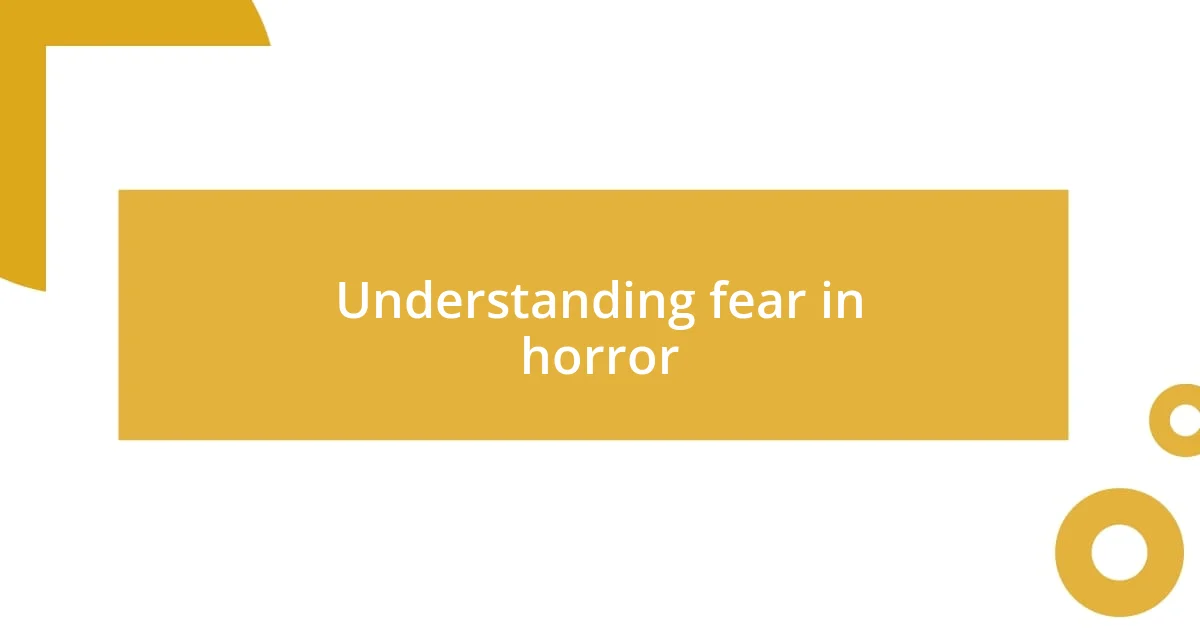
Understanding fear in horror
Understanding fear in horror is a fascinating journey. I’ve often found that horror uniquely taps into our primal instincts, awakening something deep within us. Why does the sound of creaking floorboards send shivers down our spine? Perhaps it’s the eeriness of uncertainty—our minds racing to conjure what lurks in the shadows.
I remember watching a classic horror film late one night. Alone in my living room, I felt my heart racing as the protagonist slowly crept down a dimly lit hallway. The tension was almost unbearable, but it made me think: what is scarier, the monster itself or the suspense of its imminent reveal? This suspense is where fear takes form, often leaving us more haunted by our imagination than what’s technically on screen.
In horror, fear often draws from both the familiar and the unknown. I’ve learned that when a film reflects real-life anxieties, the fear is amplified. It’s this interplay that draws us in—giving us a safe space to explore our deepest fears without the real-world consequences. When we confront these fears in fiction, we can begin to understand and process them in our lives. Isn’t that a comforting thought?
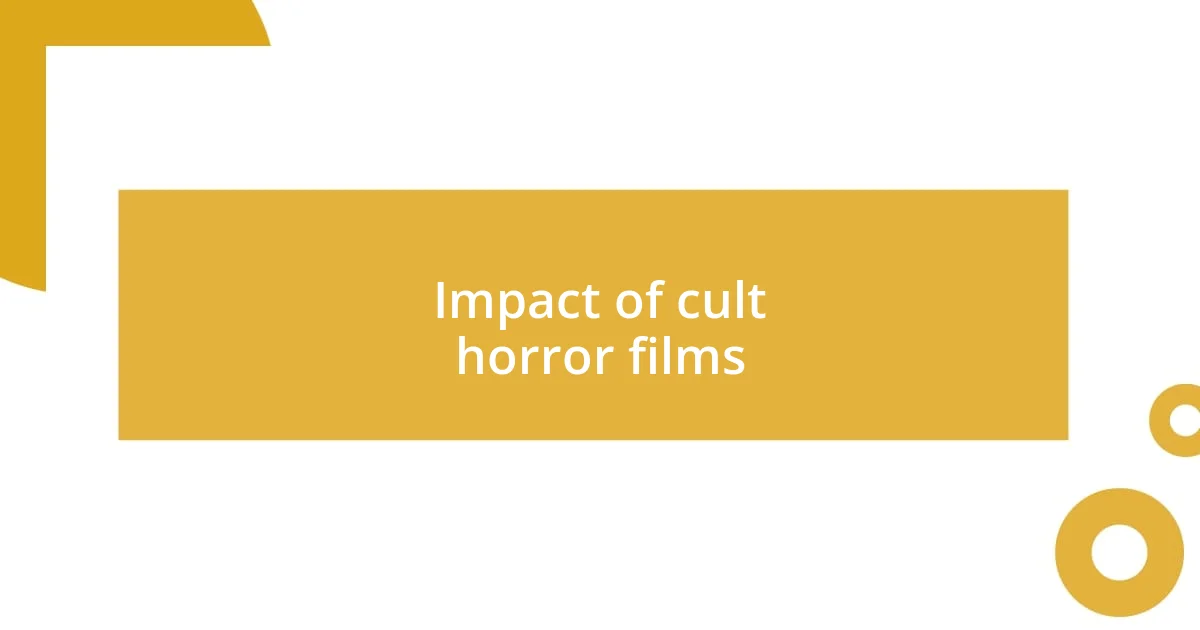
Impact of cult horror films
Cult horror films leave a lasting impact on both viewers and the genre itself. They often provoke thought and spur discussions about social issues, which can be enlightening. For instance, I vividly remember watching “Get Out” for the first time; it was more than just a horror film. It pushed me to confront uncomfortable realities about race and privilege in a uniquely engaging way. That’s the power of cult horror—it explores themes that resonate beyond the screen, leaving audiences reflecting long after the credits roll.
Another compelling aspect of cult horror is its distinctive ability to forge communities. My experience at various horror film festivals has shown me the incredible camaraderie that forms among fans. It’s a place where people share their interpretations, theories, and even personal fears inspired by these films. I once had a profound discussion about “The Shining” with a stranger I met while waiting in line. We both realized that the idea of isolation and madness struck a personal chord, highlighting how these films can evoke deeply personal emotions and connect us to one another.
Finally, cult horror films often challenge conventional norms and push boundaries. Their exploration of taboo subjects invites viewers to confront their own fears and biases. For instance, after watching “Hereditary,” I found myself contemplating family dynamics in a way I hadn’t before. The visceral way it portrayed grief and trauma resonated with me personally, making it impossible to forget. It reflects how cult horror can serve as a mirror for our own experiences, sometimes revealing truths we may not be ready to face.
| Aspect | Impact |
|---|---|
| Social Commentary | Provokes thought on societal issues and personal fears |
| Community Building | Fosters connections among fans and encourages discussions |
| Boundary Pushing | Challenges norms and provokes introspection about personal experiences |
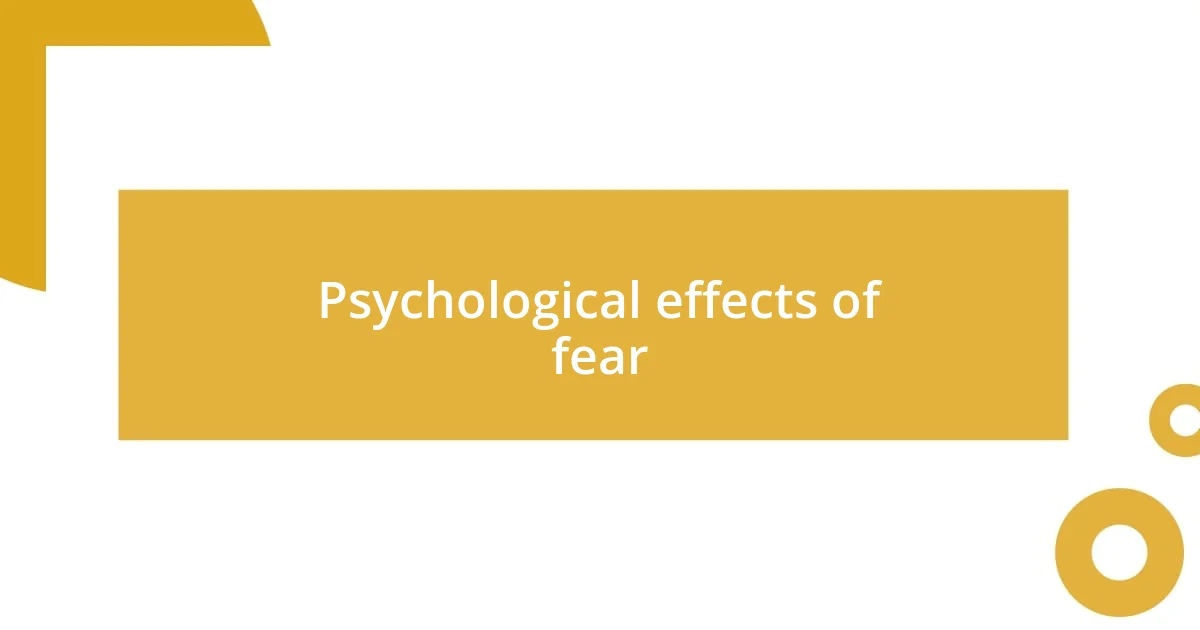
Psychological effects of fear
Fear can be a powerful force, shaping our thoughts and emotions in ways we often don’t realize. I remember a time when I was gripped by a paralyzing fear of flying. Each flight became a mental battle between my rational mind and irrational thoughts of crashing. This internal conflict left me feeling exhausted, illustrating how fear can cloud judgment and heighten our anxiety levels. It’s fascinating how such a primal emotion can trigger a cascade of psychological responses, impacting everything from our decision-making to our interactions with others.
The psychological effects of fear can manifest in various ways, often leaving lingering impressions on our mental well-being. Here are some effects that I’ve observed:
- Elevated Anxiety: Constant fear can lead to heightened anxiety levels, making daily tasks seem overwhelming. I’ve often missed out on opportunities simply because my mind raced with fears of failure.
- Paranoia and Distrust: Fear can distort our perceptions, fostering a sense of paranoia. I recall a period when I was always on high alert, suspecting the worst in every situation, which strained my relationships.
- Avoidance Behavior: One of the most compelling effects fear had on me was avoidance; social gatherings felt daunting. I remember skipping a friend’s birthday party because I feared I’d embarrass myself.
The ripple effect of fear touches every aspect of our lives, often leaving us feeling trapped in our own minds. Recognizing these patterns is the first step toward understanding and overcoming them.
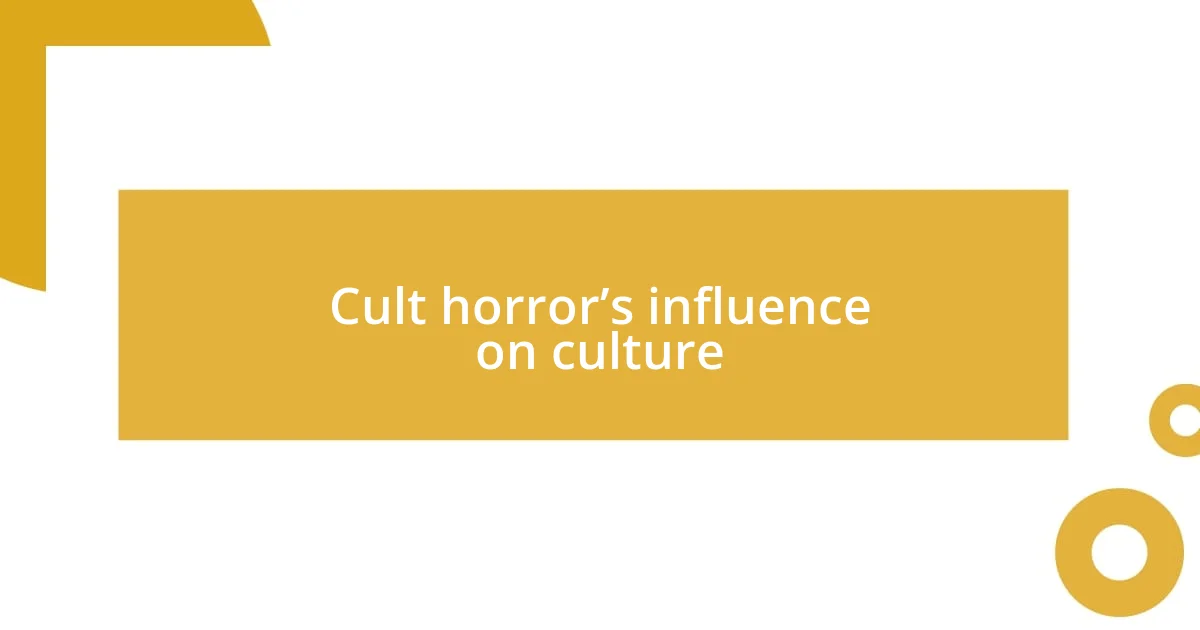
Cult horror’s influence on culture
Cult horror permeates the fabric of culture in ways that often surprise me. When I first watched “The Rocky Horror Picture Show,” it wasn’t just about the quirky characters or the catchy songs; it was a celebration of self-expression and eccentricity. It opened my eyes to the idea that embracing one’s true self, regardless of societal norms, can be a powerful act of defiance. This connection between horror and identity can be a game changer for viewers, prompting them to reconsider their own perceptions.
As I explored various cult horror communities, I began to notice something profound: these films create spaces where taboo and marginalized subjects are brought to light. For instance, I attended a screening of “The Witch,” and during the discussion afterward, participants shared experiences of feeling ostracized in their own lives. I found it fascinating how a horror film, rooted in historical witch hunts, became a platform for exploring issues of female empowerment and societal judgment. It made me realize how these stories encourage connections that can transform individual fears into communal strength.
The influence of cult horror can also be seen in contemporary art and fashion. Think about how the aesthetics of films like “Suspiria” have bled into modern design, mixing the macabre with beauty. At a local art exhibit, I marveled at an installation inspired by “The Exorcist,” which used lighting and shadow to evoke feelings of dread and fascination. It struck me that horror isn’t just meant to frighten; it’s also an influential force shaping artistic expression. I often wonder—how many of us have unwittingly been inspired by a scene from a horror film, channeling those feelings into our creative endeavors? It’s fascinating to see how deeply embedded these experiences are in our culture, often without us even realizing it.
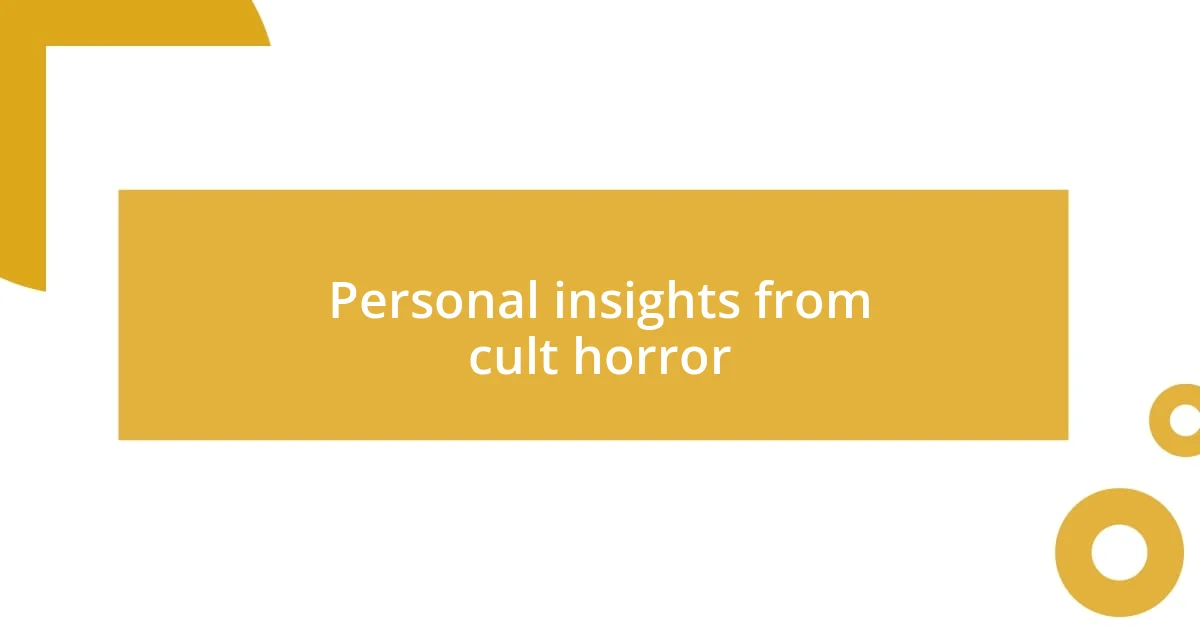
Personal insights from cult horror
I’ve learned that cult horror often shines a light on our deepest fears, inviting us to confront them rather than shy away. For instance, the raw emotional intensity in films like “Donnie Darko” compelled me to reflect on my own anxieties and existential dread. Watching the characters grapple with concepts of fate and time travel made me question how much control I really have over my life’s path. Isn’t it intriguing how horror can serve as a mirror, reflecting the chaos of our everyday fears?
As I immersed myself in the world of cult horror, I found that it not only helped me confront fear but also fostered connection with others who shared similar struggles. During a late-night screening of “Eraserhead,” I noticed a palpable tension in the room, as if everyone was experiencing their own unique fear together. Sharing those unsettling moments with fellow viewers created an unspoken bond among us. It struck me that horror has this unique ability to bring people together, igniting conversations about our vulnerabilities. How many times have we found solace in shared fear?
What truly resonated with me is the realization that fear, when explored through the lens of cult horror, is not just a feeling to avoid but a powerful source of empowerment. I remember my first exposure to “The Babadook” and the way it tackled grief and loss. The portrayal of the monster as a representation of trauma fought back my impulse to suppress my own emotions. Instead, it encouraged me to embrace them. This taught me that acknowledging fear can lead to healing and resilience. Have you ever faced a fear and found unexpected strength on the other side? The lessons I’ve gleaned from cult horror have been invaluable, and I find myself continually revisiting these themes in my own life.
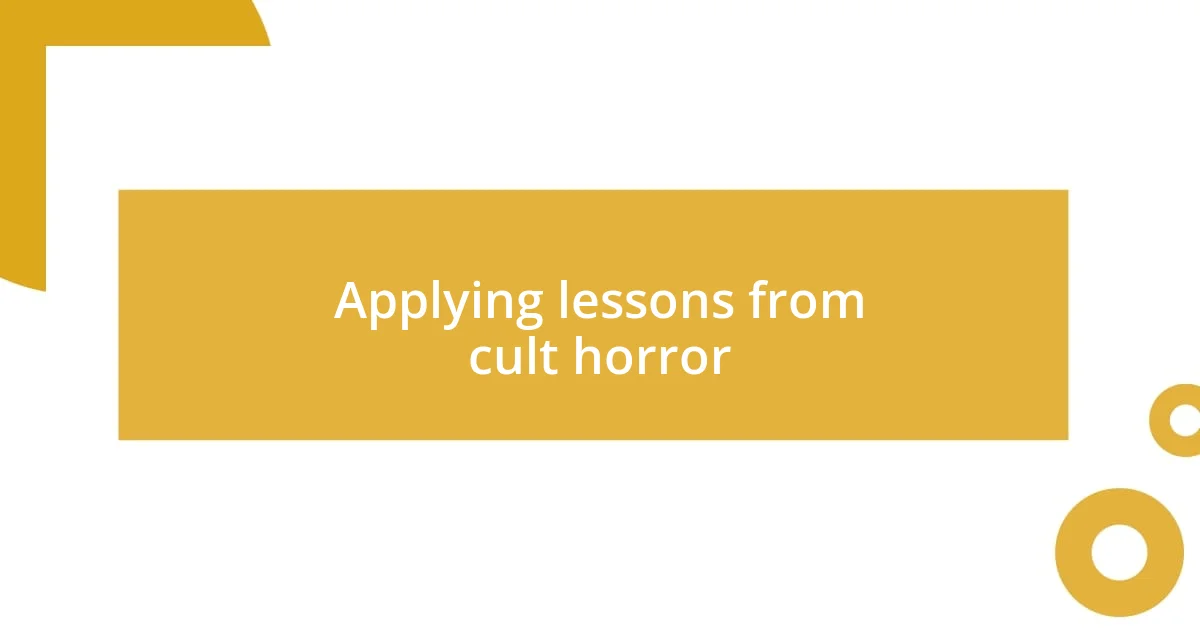
Applying lessons from cult horror
Applying lessons from cult horror has truly expanded my understanding of fear and its impact on our lives. I vividly recall attending a midnight screening of “A Nightmare on Elm Street,” where the collective gasps and laughter somehow made the horror feel less isolating. In that moment, I realized how shared experiences of fear can create a bond, turning terror into a communal adventure. Isn’t it fascinating how facing fears together can transform isolation into a sense of belonging?
Another crucial lesson I’ve drawn from cult horror is the importance of embracing discomfort. Take “Hereditary,” for instance. Watching it was an emotional rollercoaster, but it forced me to confront my own family dynamics and lingering grief. It made me ask myself: what if we allowed ourselves to sit with the discomfort of our emotions instead of running from them? It’s remarkable how horror films can challenge us to tackle difficult topics we might avoid in everyday conversations.
The artistic layers embedded in cult horror also offer a unique lens through which I’ve learned to view my fears. After watching “Get Out,” I couldn’t shake off the chilling sense of reality it presented about societal issues. It compelled me to engage in discussions about race and privilege. When a horror film can evoke such deep reflections, doesn’t that highlight the genre’s potential for sparking meaningful dialogue? I find these lessons invaluable; they remind me that acknowledging fear—be it personal or societal—can lead to growth and understanding, ultimately enriching our lives.
